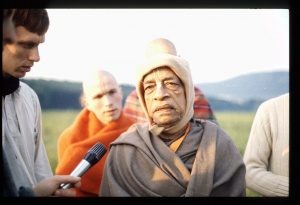SB 4.5.8

A.C. Bhaktivedanta Swami Prabhupada
TEXT 8
- vātā na vānti na hi santi dasyavaḥ
- prācīna-barhir jīvati hogra-daṇḍaḥ
- gāvo na kālyanta idaṁ kuto rajo
- loko 'dhunā kiṁ pralayāya kalpate
SYNONYMS
vātāḥ — the winds; na vānti — are not blowing; na — not; hi — because; santi — are possible; dasyavaḥ — plunderers; prācīna-barhiḥ — old King Barhi; jīvati — is living; ha — still; ugra-daṇḍaḥ — who would sternly punish; gāvaḥ — the cows; na kālyante — are not being driven; idam — this; kutaḥ — from where; rajaḥ — dust; lokaḥ — the planet; adhunā — now; kim — is it; pralayāya — for dissolution; kalpate — to be considered ready.
TRANSLATION
Conjecturing on the origin of the storm, they said: There is no wind blowing, and no cows are passing, nor is it possible that this dust storm could be raised by plunderers, for there is still the strong King Barhi, who would punish them. Where is this dust storm blowing from? Is the dissolution of the planet now to occur?
PURPORT
Specifically significant in this verse is prācīna-barhir jīvati. The king of that part of the land was known as Barhi, and although he was old, he was still living, and he was a very strong ruler. Thus there was no possibility of an invasion by thieves and plunderers. Indirectly it is stated here that thieves, plunderers, rogues and unwanted population can exist only in a state or kingdom where there is no strong ruler. When, in the name of justice, thieves are allowed liberty, the state and kingdom are disturbed by such plunderers and unwanted population. The dust storm created by the soldiers and assistants of Lord Śiva resembled the situation at the time of the dissolution of this world. When there is a need for the dissolution of the material creation, this function is conducted by Lord Śiva. Therefore the situation now created by him resembled the dissolution of the cosmic manifestation.